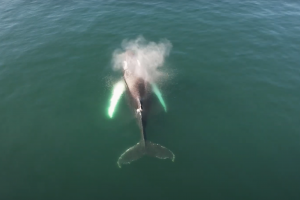
Hump Taking a Dump!
Oct 17 2022

It’s unusual to see a humpback whale in Scotland, and over the last ten years this is our third sighting of these magical creatures here in the Hebrides. On this flat calm day we had spotted the fluke of this humpback whale from a long way away, our guests on both boats were treated to an incredible display of bubble net feeding by this individual, but we were also treated to something else …
While Shane was recording on the drone this humpback whale surprised us, he said, ‘Whilst looking through our summer footage this seemed to ‘pop’ out! haha!’
Now not many people can say they have seen a humpback whale going to the bathroom, so if you are curious to find out what it looks like then we have shared the video below! In what was almost a stunning shot of the whale emerging from the water with its bright white pectoral fins, producing a rainbow like blow before peacefully descending but leaving something behind!
The humpback was feeding heavily on sand eels which makes the colour all the more interesting. Bright red faeces is usually spotted in krill eating whales, as krill is rich in iron. But did you know, humpback whale faeces is actually ecologically important?
The Importance of Whale Poo
Whale poo is unique in the fact that is plays an important role in the ocean – whales actually maintain their own prey populations. Like we saw here in this video, whales often defecate at the surface, rarely at depth. Their deep diving behaviour enacts some complex physiological functions which help them withstand life in the deep ocean, one of them being that some bodily functions are halted altogether. When the whale surfaces it creates a connection between distant parts of the ocean, cycling nutrients from the deep sea to the surface.
These nutrients play an important role in fertilising plant plankton, which in turn is essential in feeding zooplankton, other fish and the whales themselves. In areas where whales have been heavily hunted, plankton has also seen significant declines – this is worrying, as plankton plays a vital role both for the oceans and ourselves.
In this cycle whales also play a role in mitigating the affects of climate change, when these blooms of plank plankton die, they sink taking with them carbon to the bottom of the ocean. Larger blooms of plankton remove larger amounts of carbon. Whales also become a carbon sink themselves, following the suit of their food – if they reach the end of their life naturally they sink in to the depths of the sea taking with them a large amount of carbon.
So the moral of the story is, more whales and more whale poop would actually be a very good thing, and you’re never too old for toilet humour.

